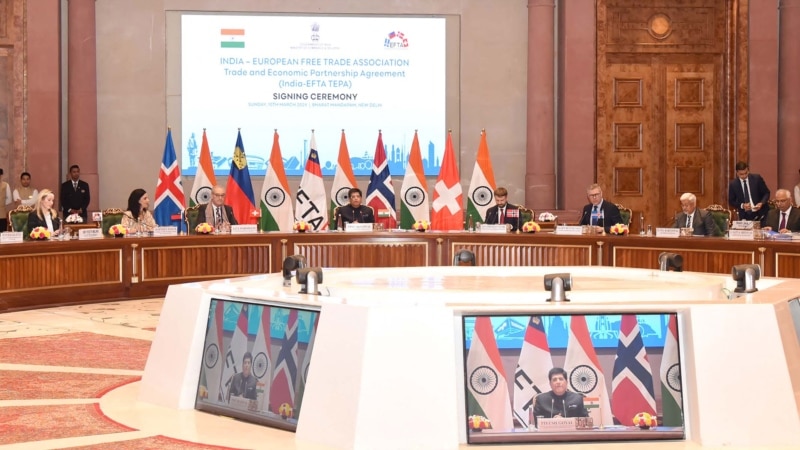India has signed a free trade pact with a group of four European nations that aims at drawing in investment of $100 billion over the next 15 years.
The deal announced Sunday with the European Free Trade Association, whose members are Switzerland, Iceland, Norway and Liechtenstein, comes weeks ahead of India’s national elections in which Prime Minister Narendra Modi has made economic growth a key poll plank as he seeks a third term in office.
The trade deal is one of several New Delhi is pursuing as it steps up efforts to grow its exports and take advantage of geopolitical shifts that are seeing many Western countries trying to reduce trade dependence on China.
The pact was sealed after about 16 years of negotiations. “The pact is significant because it is India’s first with developed countries,” according to Biswajit Dhar, trade analyst and Distinguished Professor at the Council for Social Development in New Delhi. “So far India, which has many protectionist barriers, only had such agreements with developing countries.”
To ease access to its vast market of 1.4 billion people, India will reduce tariffs on goods ranging from industrial imports to processed foods, beverages and items such as Swiss watches. New Delhi hopes to boost its exports in areas such as information technology and business services.
India is the European Free Trade Association’s fifth-largest trading partner after the European Union, the United States, Britain and China with two-way trade adding up to $18.65 billion in 2022-23.
The investment pledge by the four European countries will create one million jobs, according to Indian Commerce Minister, Piyush Goyal.
“It’s for the first time that we are inking a free trade agreement with a binding commitment to invest $100 billion in India,” Goyal said. “It is a modern trade agreement, fair, equitable and win-win for all five countries.”
European officials said pledging the investment made it a “balanced” deal for both sides. “If you look at the different market sizes, India offers 1.4bn population, plus it’s a door to the global world,” Helene Budliger Artieda, Swiss state secretary for economic affairs, told reporters.
However, trade analyst Dhar said that it remains to be seen how the investment promise translates on the ground. “These four countries had invested just $10 billion in the last 23 years. So taking this up to up to $100 billion in 15 years is a tall order, it does not seem realistic,” he said.
In recent years, India has stepped up efforts to pursue trade agreements to boost its fast-growing economy. In the last two years, it has concluded a free trade pact with the UAE and a preliminary agreement with Australia. Officials are also trying to finalize deals with Britain and Oman.
“This landmark pact underlines our commitment to boosting economic progress and create opportunities for our youth,” Modi said in a post on X after the deal with the European countries was concluded.
Modi is promising to make India, which is a lower middle-income country, a developed nation by 2047.
Bucking the trend of slowing growth in many countries, the Indian economy is growing briskly. It is expected to grow at more than 7% in the financial year that ends in March — the fastest growth among major economies.

